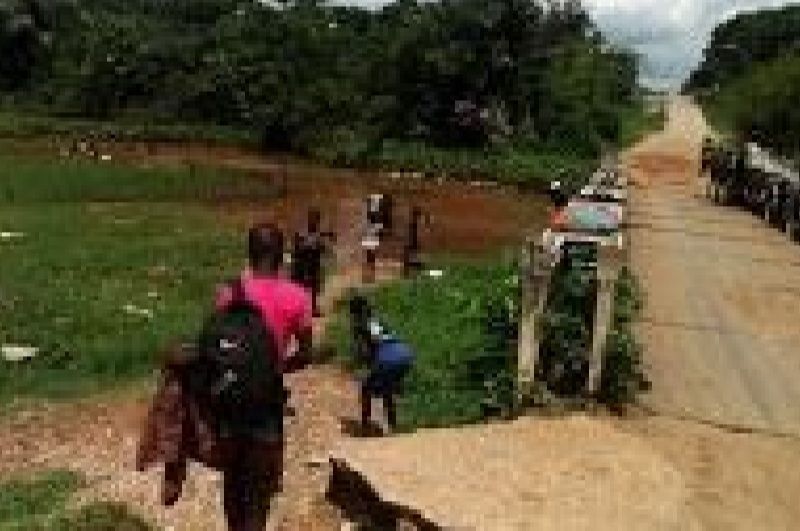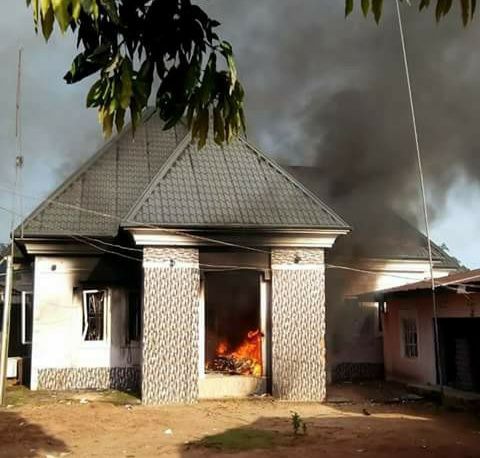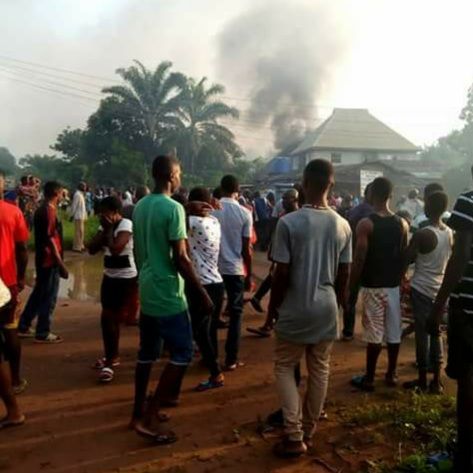Egbuoma is an Igbo community located in Oguta Local Government Area of Imo State, Nigeria.

It consists of six clans that holds twenty villages of Egbuoma
Administrative divisions of Egbuoma
Ubaokwum
Ubahudara
Ihitte Egbu
Ubaramehi
Odide
Aro-Egbuoma
Ubaokwum comprises
Umuezeala, Umuamara;
Umuolowu/Umuisiarusi;
Umuihenacho;
Umuereke;
Umuorji;
Umuegbu
Ubahudara comprises
Umuodu and Ndiodirigwe
Ihitte Egbu comprises
Umuachukwu, Omadi,
Ugwurugwuala,
Umuomirima, Ebelano,
Amagu
Ubaramehi comprises
Umudiji, Umuezike-Egbu,
Okwaubaramehi, Umuezike,
Umuehi, Umuzu, Ijem
Odide comprises
Umuokpara, Umuduru and
Umuezike
Aro-Egbuoma comprises
Ndigwe , Aruomeforonye,
Ndoti
Egbuoma has a good number of sub-communities called nkpu , in Igbo local dialect, which means human enclave that is smaller in size and population than a community and higher than a village.
These nkpu are large enough to have many villages in them. It is a well established and large autonomous community with several electoral wards and functional polling stations.

The community has large number of its sons and daughters in the diaspora who have achieved success in many spheres of human
endeavour.
The major source of living in the community is subsistent farming and petty trading.
Farmers are usually set back almost every year by the intensity and ferocity of flood in the area usually around September and October
when crops are about to mature for harvest.
Fishing is also a big part of the occupation in the community because it is a part of the Delta Region in Nigeria.
It is a rural setting which regrettably lacks provision of critical social amenities and infrastructure that can make good standard of
living.
The community has a close-styled settlement system where citizens build houses close to each other.This style of settlement is symbolic of “be your neighbour’s
keeper” .
It has a traditional ruler whose title is Eze (King) and who works hand in glove with the town union ruling body and his cabinet members to make sure the community is progressive.
The traditional institution is headed by a dynasty of Eze while the Egbuoma Progressive Union (EPU) leadership is usually on the basis of democratic election often conducted periodically.
Water supply
Various villages in Egbuoma community are regularly confronted by the challenges of water shortage.
Egbuoma community either resort to trekking long distances to fetch water from natural water body; make do with collected rain
water which is only available during the rainy season.
The community also faces the task of spending exorbitantly to buy water for household use from
private borehole owners (water vendors) who regularly grapple with spending too much money in fuelling their power generators to pump water because of the lack of electricity supply. This condition has multifaceted negative effects on quality of life in the community.
Water borne diseases are common without matching medical or healthcare services to mitigate the effects.These arise from drinking unsafe water from rain, natural water body, and well water whose purity is obviously contaminated by both natural and artificial environmental factors including the
disturbing open defecation.①
Egbuoma adjoins southward to the confluence of the rivers of Enyinja, Urashi and Oguta lake (Ugammiri), and on the eastward, demarcated with Oguta and Egwe towns by Obana River.
These rivers are great tributaries to the famous River Niger. It also shares common boundary on the west with Uli and has Ohakpu, Ozara, Amorka, Mgbidi and Ihiala as its closest neighbouring towns.
Endowed with arable and very fertile soil and seven Rivers (Ufufuachi, Oborgu, Omu, Okwukwulu, Orufe, Omadura and Obana), Egbuoma is renowned as a town with rich farm produce and palm plantation.
Egbuoma’s numerous farmlands are the delight of farmers from far and neighbouring towns in their quest to cultivate where the earth yields the best on offer.
The people of Egbuoma are mainly Christians of diverse denominations albeit some partisans of African traditional beliefs usually called “Ndi Omenala”.
Egbuoma ancient kingdom is historically a lively town with rich cultural heritage culminating in pageants ranging from Owu, Ipia-nmawu (masquerade) to Ibuputa-egwu (village dance group) but the most prominent among them is Orima.
The Orima is an annual fiesta usually held during the period of Iriji (new yam festival) in September. It is based on the sacredness/preservation of young women’s (yet to be married) virginity where on completion, the damsel/s involved becomes the pride of the entire town with many suitors coming in droves for her hand in marriage.
The period is marked with early morning panegyric of various gods of the land and the damsel/s visit some deities in the community to pay homage on bare foot while being half naked. In the evening, they are carried on the neck/shoulder by range of able-bodied men to visit the four markets square of the town for another homage. After the visit, they will retire back to the central market square (Nkwo-egbu) to sing and dance openly whilst half naked.
On completion, the participants (the young women) become hot cakes as suitors come from far and near to seek their hands in marriage.
However, greater percentage of the traditional rites associated with Orima have been killed off by piecemeal civilisation and Christianity, a welcome transformation as damsels no longer pay homage to deities or dance half naked in the market square.
Cuisine
Egbuoma like any other constituent of Igboland has as her staple: yam, cassava and corn and their varied food derivatives[3]. However, Egbuoma and her neighbouring town are uniquely known for their yam, cocoyam, corn, utara-akpu (cassava fufu), utara-ji (pounded yam) and akpakpa (pounded corn).
The above can go with different types of soups such as egusi-soup, ogbono soup, ukazi-soup, okra-soup, nsala-soup and achi-soup and many other soups prevalent in Igboland.
Ingredients for these soups include but not limited to the following: Snails, ponmo (cow skin), Goat meat, cow meat, stock fish, dried fish, smoked prawns, grounded dried crayfish, wraps of Ogili (fermented soya beans), maggi cubes, fresh pepper, grounded dried pepper, Uziza leaf, palm oil, sliced ugu leafs (pumpkin leaves), and sliced oha leafs.
Egbuoma Youths Burn Houses After Assassination Of Their Comrade
Pandemonium broke out in Ogbuoma as irate youths went on violent protest and destroyed over 18 houses while attacking anyone suspected to be connected to the assassination of Mr. Okwudiri of Omadi village in Egbuoma Community.

The deceased had a strained relationship with members of his extended family over land issues and matter was already in court.
Events took a violent turn on Sunday evening when some hoodlums, believed to be hired assassins invaded Okwudiri’s residence. He came outside the house where he was fallen by the assassins’ bullets.

After being placed under intensive care, he was pronounced dead in the early hours of Tuesday, May 22, 2018.
News of the violent death of Mr. Okwudiri went viral and irate youths descended on those they suspected as having hands in the death of their fellow kinsman.②
Egbuoma Royal Dynasty
The Umuezegbu Royal family in Ubahudara village usually produces the king of Egbuoma Kingdom, and are the custodian of the town’s sacred ofor.
The king of Egbuoma as at 2020 is HRH Ezeanogbuomba Okorie Ogbuehi (the Ezeigwe X of Egbuoma) who ascended the throne of his ancestors in 1984 following the demise of his father HRH Okorie Ogbuehi.
HRH Okorie Ogbuehi was the son of HRH Okereke Ogbuehi, HRH Okereke Ogbuehi was the son of HRH Ikoku Ogbuehi whose father was HRH Onyemaobi Ogbuehi. HRH Onyemaobi Ogbuehi was the son of HRH Anyaenyi Ogbuehi whose father was HRH Ekulite Ogbuehi. HRH Ekulite Ogbuehi was the son of HRH Onyeriuka Ogbuehi whose father was HRH Iroagba Ogbuehi. HRH Iroagba Ogbuehi was the son of HRH Mbalieto Ogbuehi whose father was HRH Ekerezeke Ogbuehi.
Reference
① Impact of Poor Social Amenities on Quality of Life in Rural Communities: A Study of Egbuoma
Community, Imo State, Nigeria.
Nnaeto Japhet Olusadum
journalspress.com/LJRHSS_Volume20/909_Impact-of-Poor-Social-Amenities-on-Quality-of-Life-in-Rural-Communities-A-Study-of-Egbuoma-Community-Imo-State-Nigeria.pdf
②nationalhelm.co/2018/05/irate-youths-on-rampage-after-assassination-their-comrade-in-imo-photos.html